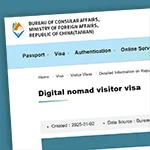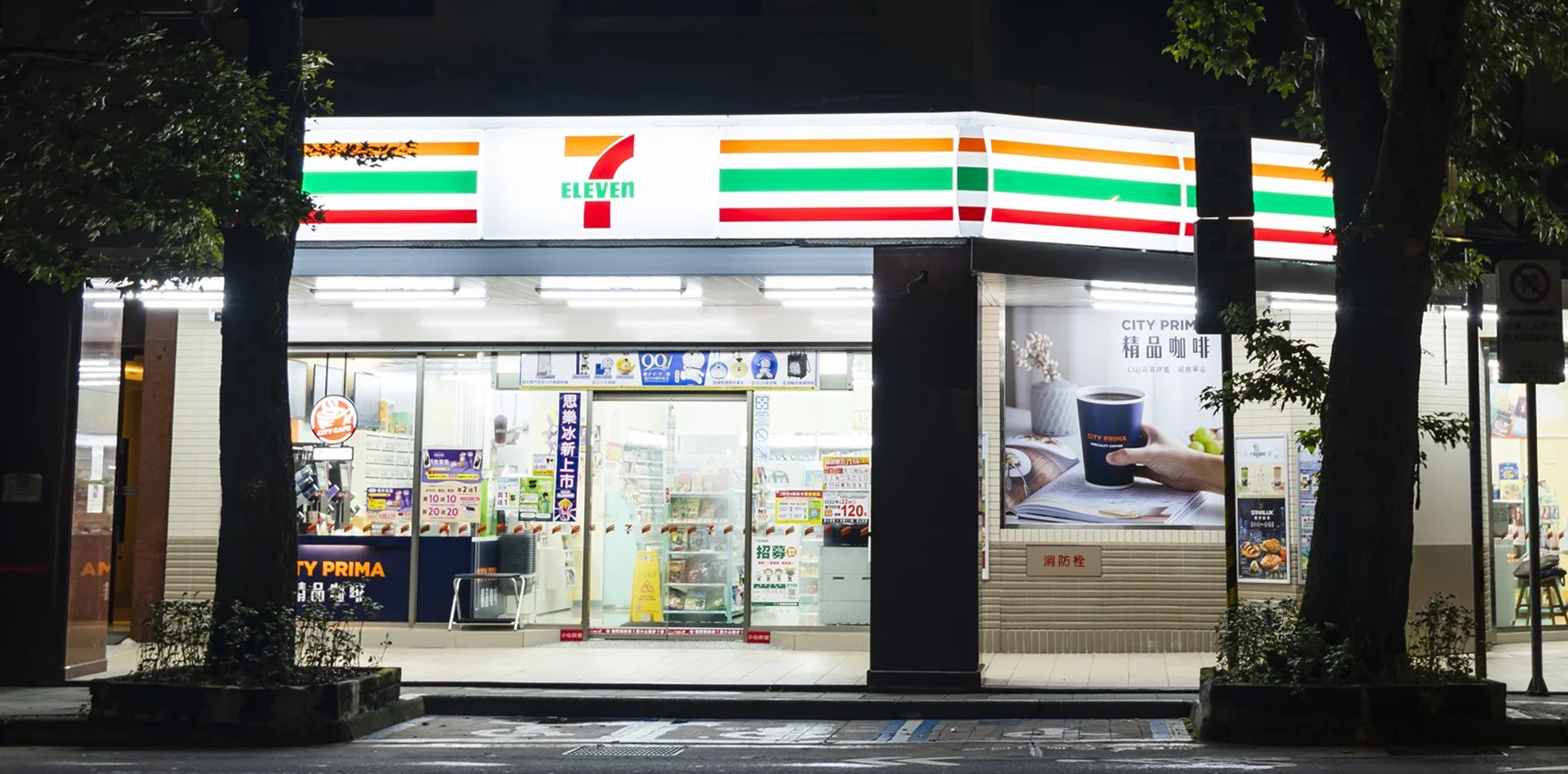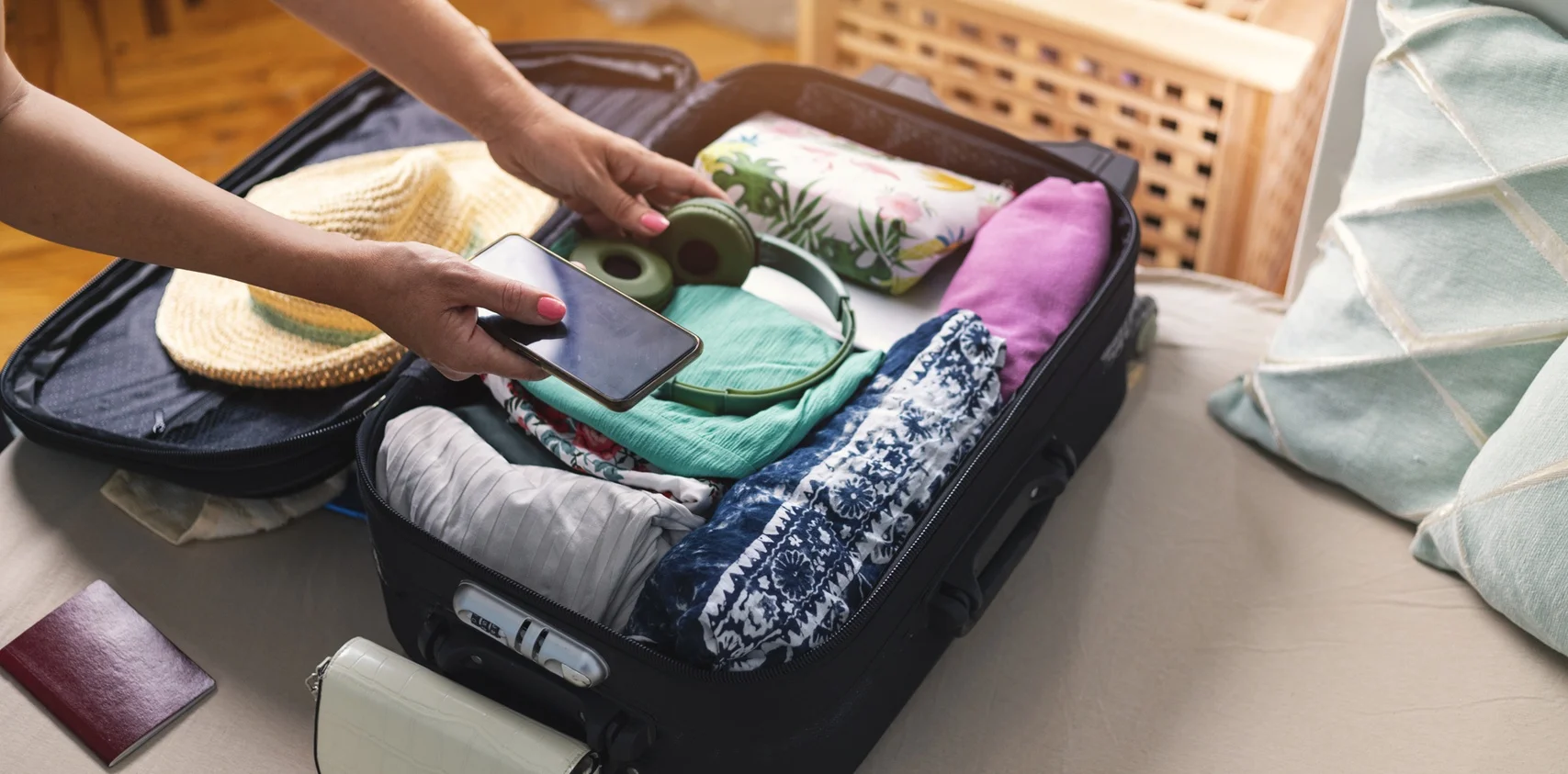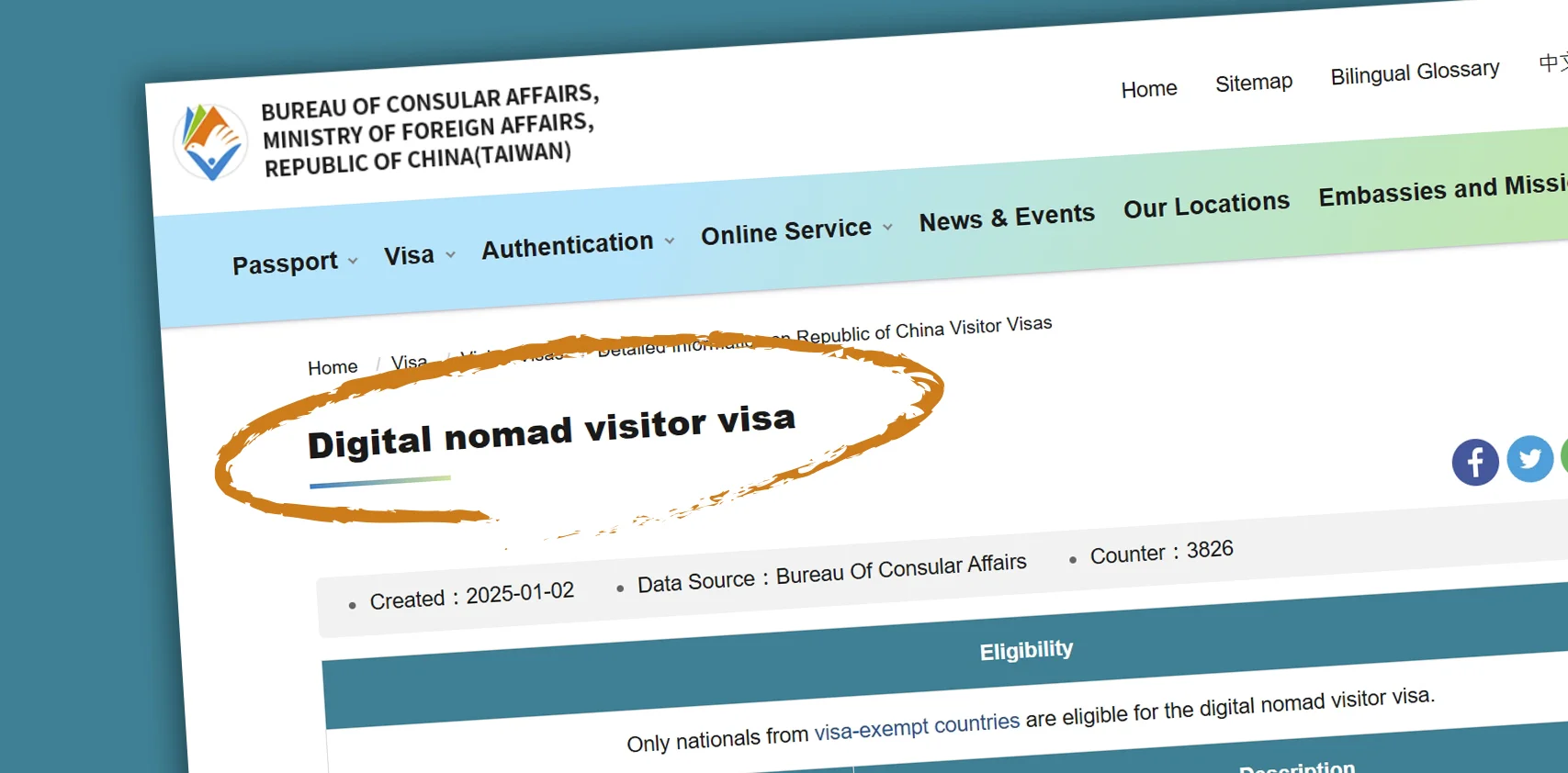

1
Taiwan Digital Nomad Visa is Here! Application Requirements and Required Documents All in One View!

2
Vegetarian-Friendly! Top 10 Cities for Vegetarian Digital Nomads Worldwide

3
7 Habits for Maintaining Efficiency in Online Meetings
THE LATEST

Why Taiwan’s 7-Eleven Is the Nomad’s Best Friend?
When you think of a convenience store, you probably imagine a place where you grab a bottle of water, maybe a bag of chips, and rush out in under two minutes. But in Taiwan, the experience is completely different. As a digital nomad living here, I can say this with full confidence: 7-Eleven is more than a convenience store—it’s a life hub. Whether you're working remotely, navigating local bureaucracy, or just trying to survive your first typhoon season, 7-Eleven becomes your reliable, all-purpose sidekick. Here’s why every nomad in Taiwan should get to know their neighborhood 7-Eleven (and maybe even become emotionally attached to it). 🧑💻 1. Your Backup Coworking Space Sometimes the coworking space is full, or your Airbnb Wi-Fi goes out right before a Zoom call. No problem—just walk into a nearby 7-Eleven. Many stores have indoor seating, power outlets, and reliable air conditioning. Some even offer free Wi-Fi (especially in urban areas). It's not unusual to see students, freelancers, and office workers typing away in the corner, iced latte in hand. And that latte? Made fresh by a machine that delivers surprisingly decent espresso. Add an egg salad sandwich and you're ready for a productive morning. 🍱 2. Meals, Snacks & Midnight Survival Kits Need a quick lunch between calls? 7-Eleven has you covered with hot bentos (lunchboxes), rice balls, dumplings, pasta, and even vegan options. The food is affordable, filling, and rotates seasonally—yes, there’s a pumpkin-flavored croquette in fall and sweet potato desserts in winter. Late-night hunger pangs? No problem. Most stores are open 24/7, and yes, the staff will microwave your meal, give you utensils, and smile while doing it. 🖨️ 3. Print, Scan, Fax—All Without a Printer One of the biggest struggles for nomads is accessing printing and scanning services. In Taiwan, just walk to 7-Eleven and use the ibon machine. You can: Print documents from your USB or cloud Scan and email files Make photocopies or fax something if needed Even print passport photos or buy resume templates! The interface is available in English, and the process is fast and shockingly cheap. 📦 4. Your Personal Mailroom Online shopping is huge in Taiwan, and 7-Eleven plays a central role in the logistics system. You can: Pick up packages from Shopee, PChome, or other platforms Send local or international parcels Even rent lockers in some branches to receive deliveries while you're out exploring Taroko Gorge No apartment mailbox? No problem. 💡 5. A Swiss Army Knife of Life Services This is where 7-Eleven goes full superpower mode: Pay your rent, electric bill, or even traffic fines Recharge your SIM card, MRT card, or game credits Book train tickets, concerts, or theme parks Use the ATM to withdraw money (many support international cards) Buy tickets for exhibitions, shows, or even a spa reservation All of this is done at the kiosk or counter, often with staff willing to help if you get confused (they’re used to expats and tourists!). 💬 6. The Cultural Warmth You Didn’t Expect Beyond the services, 7-Eleven is a microcosm of Taiwanese hospitality. Store clerks greet you with a “歡迎光臨” (huān yíng guāng lín — welcome) every time. Some will remember your face or your coffee order. You might find yourself chatting with a fellow nomad while waiting for the microwave to finish. It’s the place you go when everything else is closed, when you're slightly lost, or when you just need a quiet corner to collect yourself. It becomes part of your daily rhythm. 🧳 Conclusion: A True Friend on the Road For digital nomads in Taiwan, 7-Eleven isn’t just a convenience—it’s a daily lifeline. It meets practical needs, yes, but also offers a subtle form of companionship in a foreign land. It's your office, your kitchen, your mailbox, your translator, and your guide—all wrapped in one neon-lit, air-conditioned corner of comfort. So next time you're in Taiwan, don't just pass by a 7-Eleven. Step inside, grab a hot latte, and get stuff done. You’ll walk out wondering how you ever lived without it. -- Follow the Digital Nomad Facebook fan page and stay updated with more recent articles on Instagram (@digital.nomad.press)!
June 10, 2025

Digital Nomad Pre-Departure Checklist: The Simple Packing Guide
1. Packing Principles : Nomadic Life ≠ Backpacking Trip A digital nomad’s luggage must support both work and daily life. So before packing, remember these three key principles: Lightweight but not careless: You’re not on vacation—you’ll be working remotely for an extended period. Multi-functionality is key: Every item you bring should ideally serve two or more purposes. Backup and flexibility: In case of internet outages, locked cards, or lost items—you need a Plan B. 2. Digital Nomad Gear Checklist (Global Essentials) 1. Remote Work Kit 2. Minimalist Living Kit 3. Safety & Emergency Kit 4. Optional but Helpful Add-ons 3. Commonly Overlooked Essentials These items may seem minor, but many digital nomads regret not bringing them once they’re on the road: Power strip (with USB ports): Many places only offer one outlet—use a strip to charge laptop, phone, and earbuds all at once. Earplugs and sleep mask: In hostels, airplanes, or noisy neighborhoods, good sleep is gold. Backups of passport and key documents: Scan and upload to Google Drive; print a set and hide it deep in your bag. Multiple credit/debit cards: If one gets locked, you’ll have a backup. Understand how insurance claims work: Don’t just buy insurance—know what documents are required and prepare templates in advance. Prescription meds or personal health items: Your go-to brands or specific ingredients might not be available abroad. Feel free to share with us—what are your must-have essentials for digital nomad life? -- Follow the Digital Nomad Facebook fan page and stay updated with more recent articles on Instagram (@digital.nomad.press)!
April 16, 2025

The Guide to Digital Nomad Life in Taiwan|Top 4 Cities Compared! Transportation, Cost of Living, English Friendliness & More
Digital Nomad Life in Taiwan|City Breakdown Taipei As Taiwan’s capital, Taipei is the economic, cultural, and tech hub of the country. It's highly international, making it one of the most English-friendly cities in Taiwan. If it’s your first time here and you enjoy vibrant, fast-paced city life, Taipei should be your go-to. Taipei boasts the island’s most comprehensive MRT and bus system, covering 21 districts in both Taipei and New Taipei City. Whether you’re heading to busy areas like Ximending, Dihua Street, Tamsui Pier, or enjoying snacks at Raohe or Ningxia Night Markets, public transport will get you there easily. The city never sleeps—nightlife in Xinyi or the East District, 24/7 convenience stores, and endless food options make Taipei incredibly convenient. Transportation: ★★★★★ (Best MRT and bus system in Taiwan) Cost of Living: ★☆☆☆☆ (Higher accommodation and food costs) English Friendliness: ★★★★☆ (Tourist areas and younger people are communicative) Taipei – Chiang Kai-shek Memorial Hall(Photo from iStock.) Taichung Often considered Taiwan’s most livable city, Taichung offers a lower cost of living and pleasant weather. Centrally located, it’s also a great base for traveling north or south. While the MRT is smaller compared to Taipei, Taichung’s bus system is well-organized, making it suitable for both short visits and long-term stays. For the best experience, consider living in West District or Nantun District, which have good amenities, cafes, and coworking spaces. Explore places like Rainbow Village, Audit Village, Calligraphy Greenway, or Fengjia Night Market. For nightlife, Taichung has unique bars and scenic rooftop restaurants worth checking out. Transportation: ★★★☆☆ (Limited MRT, mostly buses and scooters) Cost of Living: ★★★☆☆ (Mid-to-low range) English Friendliness: ★★★☆☆ (Basic communication possible) Taichung – Audit Village(Photo from iStock.) Tainan Known as Taiwan’s ancient capital, Tainan is full of historical sites, traditional architecture, and rich cultural heritage. It also offers warm weather, a slower pace of life, and affordable living, making it an ideal spot for cultural immersion. Although Tainan lacks an MRT system, downtown buses are frequent and hotspots are relatively close together. For trips outside the city center, renting a car or using taxis is recommended. Stay in West Central or Anping District, where you can walk or bus to temples, museums, markets, and seaside spots. Don’t miss the Confucius Temple, Tainan Art Museum, Guohua Street, Flower Night Market, Chihkan Tower, or Yuguang Island for a balance of work and leisure. Transportation: ★★☆☆☆ (Mainly buses and walking, no MRT) Cost of Living: ★★★★☆ (Low living expenses) English Friendliness: ★★☆☆☆ (Basic communication possible) Tainan – Confucius Temple(Photo from iStock.) Hualien & Taitung Taiwan’s east coast is known for its breathtaking natural landscapes and laid-back lifestyle. However, transportation is limited, so renting a car or taking taxis is advised. Living here allows you to enjoy high quality of life at a lower cost. Must-see spots include Sanxiantai, Mr. Brown Avenue, and Zhiben Hot Springs in Taitung, or Taroko Gorge, Qingshui Cliffs, and Qixingtan Beach in Hualien—ideal for nature lovers. In Dulan, Taitung, you’ll find a growing international community of surfers, artists, and expats attracted by the slow life and vibrant Amis Indigenous culture. If you're looking to escape the city and embrace a more free-spirited lifestyle, Taiwan’s east coast offers boundless inspiration. Transportation: ★☆☆☆☆ (Mainly railways, limited buses; car rental recommended) Cost of Living: ★★★★★ (Relatively low) English Friendliness: ★★☆☆☆ (Basic communication possible) Hualien – Yuli Red Bridge(Photo from iStock.) Taitung – Sanxiantai Cross-Sea Footbridge(Photo from iStock.) Further Reading: Taiwan Digital Nomad Guide | Visa, Currency Exchange, Weather, Internet All in One View -- Authors/Irene Lin、 Digital Nomad Editor Group Follow the Digital Nomad Facebook fan page and stay updated with more recent articles on Instagram (@digital.nomad.press)!
April 9, 2025

Remote Work in Taiwan for Over 90 Days? You Must Pay Income Tax !A Guide to Taiwan’s Income Tax Rules for Foreigners
Many foreigners are considering coming to Taiwan for digital nomadism. This year, the Taiwanese government has also opened applications for a digital nomad visa, attracting even more interest. One of their key concerns is: Do I need to pay income tax in Taiwan? If so, how is it calculated? This article will clarify Taiwan’s income tax rules for digital nomads, helping them understand their tax obligations and avoid unnecessary tax risks due to unfamiliarity with local regulations. Do You Need to Pay Income Tax? It Depends on Your Stay Duration and Tax Status Taiwan’s tax residency status primarily depends on the number of days a foreigner stays in Taiwan. There are three main categories: 1. Stay Less Than 90 Days (Exempt from Tax Unless Earning Taiwan-Sourced Income) If a foreigner stays in Taiwan for less than 90 days within a calendar year, they generally do not need to pay income tax unless their income is sourced from Taiwan. Taiwan-Sourced Income: If the foreigner provides services to a Taiwan-based company, is employed by a Taiwan company, or earns income directly linked to Taiwan, they are subject to tax. Typically, the Taiwan-based company will withhold the tax at the source, or the individual may need to file before leaving Taiwan. Non-Taiwan-Sourced Income: If a digital nomad’s income comes from an overseas employer or clients (e.g., freelancing or receiving salaries from an overseas company) and has no Taiwan-sourced income, they usually do not need to file income tax in Taiwan. 2. Stay Between 90 and 183 Days (Taxable Income Required to Be Declared) If a foreigner stays in Taiwan for more than 90 days but less than 183 days, their tax obligations change: Income from Taiwan Companies: The Taiwan-based company typically withholds tax at the applicable rate, or the individual may need to file a tax return before leaving Taiwan. Income from Foreign Employers: If a foreigner provides services to overseas clients while in Taiwan, they may need to proactively declare and pay tax before leaving. With Taiwan’s digital nomad visa, foreigners can stay for a maximum of six months. If they stay in Taiwan over 183 days using another visa or method, a different tax calculation applies. 3. Stay 183 Days or More (Taxable Under Taiwan’s Progressive Tax Rate System) If a foreigner stays in Taiwan for 183 days or more, they are considered a tax resident and must declare global income to the Taiwanese government. Their income is subject to progressive tax rates (5% to 40%) as follows: Income tax filing must be done between May 1 and May 31 of the following year for the previous year’s income. However, if a foreigner leaves Taiwan mid-year, they must file their income tax return at least 10 days before departure. Foreign nationals can file their income tax with the local National Taxation Bureau or relevant offices in each region. For detailed tax information, please contact the National Taxation Bureau or visit their official website. References: Taiwan Income Tax Act Ministry of Finance Tax Portal – Foreign Taxpayer Services R.O.C. Source Income and Scope of Exemptions Further Reading : Taiwan Digital Nomad Visa is Here! Application Requirements and Required Documents All in One View! -- Follow the Digital Nomad Facebook fan page and stay updated with more recent articles on Instagram (@digital.nomad.press)!
March 14, 2025

Foreign Digital Nomads in Taiwan! Living Pros & Cons, Housing, Social Life , and More| Freelance Software Engineer Cédric Lignier Exclusive Interview
In 2018, Cédric reached his tenth year as a software engineer, working in Silicon Valley, USA. This was also the year he left his job and, along with his wife who also works in IT, embarked on a journey as digital nomads. "At first,we planned to take a year off to travel and then come back to work. But after some research, we found that maybe we can try to travel for over one year," Cédric explains. His wife, who initially kept a full-time job while working remotely, later decided to follow his example. Inspired by his flexible lifestyle and income mostly from investing, she also quit her job and started her new life. Their journey began from Montreal, Canada (since his wife still needed to handle U.S. work matters and couldn’t leave the Americas due to time zones), and led them through Mexico, Spain, Portugal, France, and finally Asia, where they explored Thailand, Vietnam, and Bali, Indonesia. In 2020, when the pandemic disrupted their travel plans, they decided to change their original plan of visiting Japan and came to Taiwan. (Photo from Cédric) Settling in Taiwan: Embracing Diverse Outdoor Activities and the Convenience of Taipei’s MRT Cédric shares that he and his wife initially came to Taiwan by chance, given Taiwan’s highly acclaimed pandemic response at the time. So why did they choose to stay, obtain Taiwan Employment Gold Card for permanent residency, and continue to consider Taiwan a “second home,” even as international travel has become easier? The reasons primarily include: 1. Natural Environment and Variety of Outdoor Activities Compared to large urban centers, Cédric and his wife prefer peaceful, natural surroundings. During their time in Taiwan, they explored many locations, perhaps even more than some locals, including Alishan, Kenting, Taitung, Green Island, Penghu, and Xiaoliuqiu. Cédric is especially drawn to Taiwan’s landscapes and cultural richness. He has also enjoyed outdoor activities, such as river tracing, climbing Yushan, and cycling from Hualien to Taitung. The ability to easily access various natural settings is one of the most attractive aspects of living in Taiwan for him. (Photo from Cédric) 2. Safety After spending time in North and South America and Europe, Cédric found the safety in Asia, especially Taiwan, remarkably reassuring. “By safety I mean people don’t have to worry if they misplace an item. For example,I left my GoPro on a YouBike in Kaohsiung, only realizing it was missing once I was on the train back to Taipei. Fortunately, when I contacted lost and found, they told me someone had already turned it in. On our next visit to Kaohsiung, I was able to retrieve it,” he explains. In France, however, it’s easy to lose items to pickpockets, even if you keep them with you. He also mentions that in some areas of the U.S., people are mindful of firearm-related safety; while traveling in Mexico, they had to stay vigilant due to the common risk of carjacking by gangs. Aside from these points, Cédric also praises the signage and cleanliness of Taipei’s public transportation. Compared to Thailand or Vietnam, he finds Taipei’s MRT more easier to understand for foreigners, allowing his parents,who even don’t speak English,navigate the city with ease by following the color coded line and stop numbers. Additionally, the cleanliness of the MRT and buses far surpasses that of the U.S. and France. Inconveniences: Banking and Language Barriers in Smaller Cities Of course, living in a foreign culture with a different language isn’t without challenges. For example, Cédric points out that, in Taiwan, many banking matters still require in-person visits, whereas most banking services abroad can be handled online. Opening a bank account in Taiwan requires an online reservation, followed by nearly two to three hours at the bank to complete all the procedures. If you need to update information, the entire process has to be repeated. “That is painful. We used to do everything online in California or in the US or even in Europe,” he remarks. While English works well in Taipei, other cities can pose challenges if one doesn’t speak Mandarin. When faced with language barriers, he often relies on gestures and Google Translate. He admits that although he has learned a bit of Mandarin, the convenience of using English in Taipei has kept him from fully committing to learning. His most-used Mandarin phrase? In his accent, he replies in Chinese:bubble tea, less ice, no sugar. (Photo from Cédric) Travel-Friendly Short-Term Rentals and Building Friendships Through Shared Interests After weighing the conveniences and inconveniences, Cédric is still enamored with Taiwan. Not only did he settle down, but he also became involved with Crossroads, a non-profit organization working with the Taitung County Government to promote the digital nomad platform TTnomads. Through various cultural activities, they attract digital nomads worldwide to explore Taiwan. As an experienced expat in Taiwan, he also shares some practical tips for newcomers. [Housing] Cédric suggests evaluating one’s own needs when choosing accommodations. For him and his wife, a kitchen is essential since they enjoy cooking. They prefer flexible short-term rentals to explore different cities without the constraints of a one-year lease, typically finding housing on Airbnb and staying at least a month in each location. For shorter trips, they generally use Booking.com. [Mobile Plans] Since they only use their phones when needed (such as for maps), they opted for prepaid SIM cards with around 2GB of data rather than pricier unlimited plans.“They are easy to get and can get reloaded at 7-11 very easily as well,”he added. [Transportation Card] A must-have for life in Taipei is an EasyCard, which Cédric uses to ride the MRT and often to rent Ubike. Speaking of the EasyCard, he laughs, “I thought it’d be a plain card, but there are all kinds of designs to choose from in Taiwan.” If you plan to explore Taipei and its surroundings extensively by using public transportation, you can also buy a T-pass.For just 1,200 NTD per month, you can enjoy unlimited rides on the metro and buses. (Photo from Cédric) [Making Friends] In a new place, how does one make friends? Cédric shares that he and his wife started by using Meetup, where people organize various events. They joined hiking groups, allowing them to meet like-minded friends for regular outings. Later, they also connected with others through the events holding by Taiwan Employment Gold Card Office. Cédric explores aboriginal culture in Taitung. (Photo from Cédric) Having lived in Taiwan for several years, they now look forward to traveling more internationally. After a recent trip to South Korea and now visiting family in California, Cédric and his wife plan to spend one month each year in the U.S. and France with family, while returning to Taipei for two to three months every spring and traveling to other countries during the remaining months. “I think Taiwan is a beautiful place which is underrated,and it has so much potential.” Cédric exclaims. He notes that many people are unaware of Taiwan, or know it mainly due to political issues with China, rather than its beauty. He’s keen to share Taiwan’s charms on his website, Nomad Numbers, and looks forward to returning after their U.S. and France visits! -- Follow the Digital Nomad Facebook fan page and stay updated with more recent articles on Instagram (@digital.nomad.press)!
February 26, 2025

Taiwan Digital Nomad Visa is Here! Application Requirements and Required Documents All in One View!
Taiwan Digital Nomad Visa Officially Launched in January 2025! In the past, foreign digital nomads entering Taiwan under visa-free entry could only stay for up to 90 days. Now, with the Digital Nomad Visa, the maximum stay is extended to six months. Whether you are a freelancer or a remote worker employed by a foreign company, as long as you are from a visa-exempt country and meet the required salary, age, and work conditions, you can apply. According to the "Application Guidelines for Foreigners Applying for a Digital Nomad Stay Visa" published by the Bureau of Consular Affairs, Ministry of Foreign Affairs, here are the details for applying for the Digital Nomad Visa: Taiwan Digital Nomad Visa|Eligible Applicants Applicants must be citizens of a country that enjoys visa exemption status with the Republic of China(Taiwan). Taiwan Digital Nomad Visa|Required Documents Visa application form Two 2-inch color passport photos taken within the last six months (white background) Original passport and a photocopy (valid for at least six months) Proof of remote work(Personal resume and portfolio、Work contract、Completed Description of Intended Activities form) Additional supporting documents choose one of the following: (1)Previously issued Digital Nomad Visa from another country (2)Aged 30 or above, with an annual income of at least USD 40,000 in any of the past two years (3)Aged 20-30, with an annual income of at least USD 20,000 in any of the past two years Proof of regular bank deposits for the past six months, with an average monthly balance of at least USD 10,000 International health insurance certificate Other documents as required on a case-by-case basis Taiwan Digital Nomad Visa|How to Apply If you have not yet entered Taiwan, submit your application to an R.O.C. (Taiwan) overseas mission. If you are already in Taiwan, you can apply at the Bureau of Consular Affairs or one of the Central, Southwestern, Southern, or Eastern Taiwan Offices of the Ministry of Foreign Affairs (MOFA) at least 10 working days before your current stay expires. For detailed information, please refer to the "Application Guidelines for Foreigners Applying for a Digital Nomad Stay Visa" For more information on digital nomad life in Taiwan, check out: Taiwan Digital Nomad Guide | Visa, Currency Exchange, Weather, Internet All in One View
February 13, 2025
MOST VIEWED

